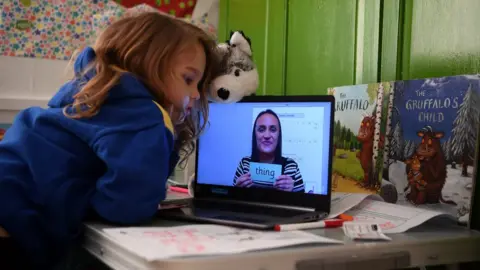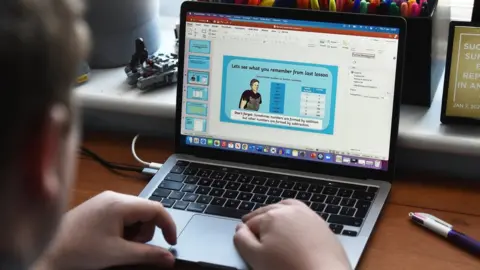Lost school time 'could cost pupils £40,000 in earnings'
 Getty Images
Getty ImagesPupils in the UK could stand to lose an average of £40,000 each in lifetime earnings from lost time in school because of Covid, a report suggests.
Any effects are likely to be concentrated among children from disadvantaged backgrounds, the Institute for Fiscal Studies said.
Parent groups say the four UK nations must "do more... to avoid a generation of children being left behind".
The IFS says the £1.5bn invested so far in "catch up" services is not enough.
The leading economic research group said "there is much that is good" with the plans to help pupils being put in place across the UK but the funding allocated to date was "tiny in comparison with the scale of problem".
UK schools are currently closed to pupils other than children of key workers and those classified as vulnerable in an attempt to curb the spread of coronavirus.
By mid-February, children will have lost half an academic year - as much as 5% of their school career - in learning time.
The IFS says its report contains an "illustration, rather than a precise prediction" of what could happen.
But it suggests that despite remote learning, some children may leave school with fewer or poorer qualifications.
The IFS says the reduction in face-to-face teaching could potentially result in a total of £350bn in lost lifetime earnings for the UK's 8.7m schoolchildren, adding this would hit future tax revenues.
The institute refers to findings by the World Bank that a year of schooling increases an individual's earnings by an average of 8% a year in an advanced economy such as the UK.
For anyone earning the average yearly wage in the UK, the IFS estimates, this would translate to a potential £40,000 loss in income across a lifetime, leading it to warn that "the long-run costs of the pandemic will fall disproportionately on today's children".
The IFS says even if "much weaker assumptions" are made, there could still be £90bn in lost lifetime earnings.
Schools in England and Northern Ireland will remain closed to most pupils until at least 8 March.
In Wales, some primary-school children may start to return after the half-term break, while the Scottish government has ruled out a mid-February reopening.
The Department for Education has pledged an extra £300m in the next financial year for catch-up services in England, in addition to its existing funding allocation of £1bn.
A DfE spokesperson said "the prime minister was clear last week that extended schools closures have had a huge impact on pupils learning, which will take more than a year to make up.
"The government will work with parents, teachers and schools to develop a long term plan to make sure pupils have the chance to make up their learning over the course of this parliament."
The National Tutoring Programme helped almost 70,000 children in England during the autumn term and will benefit from a portion of the additional government funding to assist disadvantaged pupils.
'I worry for their future'
Comfort Oghenesuvwe, a single mother of two boys, who lives in Kent, told BBC News: "If something is not done to help my boys catch up when things return to normal, I worry for their future."
Both of Ms Oghenesuvwe's children - Jason, 11, and Jeffrey, 10 - have learnt from home during England's first and third nationwide lockdowns.
"Jason has been particularly affected as he has additional learning needs and would normally require a teacher to come to his table to double-check he understands everything, but that's not possible over Zoom.
"Back in April, we only had one laptop before we bought an extra one and Jason's learning had to be prioritised, so Jeffrey had to sit and colour, or just read a book at times.
"I've definitely seen Jeffrey's momentum for wanting to learn and read, which he used to enjoy, drop off as a result."
 Getty Images
Getty Images"What's going to come out of this experience is an entire patchwork of new inequalities layered on old inequalities," said Luke Sibieta, the IFS researcher behind the report.
Younger children from disadvantaged families, who may have not had access to the right equipment for remote learning, will feel the impact most, he told BBC Radio 4's Today programme.
"They were probably the furthest behind to begin with," he said.
The government's plan for a "catch-up" service will "cushion" the impact, he said, "however it just doesn't match up to the scale of the problem".
"The scale of the policy response needs to be larger than it is at the moment."
'Targeted help'
The IFS estimates that half a year of schools spending is more than £30bn across the UK and says "correcting a loss on this scale certainly requires a massive injection of resources".
John Jolly, chief executive of charity Parentkind, told BBC News: "The government must do more and invest more to close the educational divide and to avoid a generation of children being left behind."
James Turner, chief executive of the Sutton Trust educational charity, echoed the IFS call for extra funding. He said: "It is absolutely crucial that this is targeted towards disadvantaged pupils who have been the worst-hit by the pandemic.
"As a start, the pupil premium should be boosted this year to help schools catch up, through allocating an additional £400 to every low-income student."
The IFS report outlines options including extending the school year, lengthening the school day, mass repetition of entire school years, or summer schools to help children catch up.
Ms Oghenesuvwe said she would be open to these options for her children but said she worried about burnout among teachers.

- LOCKDOWN LEARNING: Lesson support available on BBC Bitesize for every child, of every age, every day of the week
- BITESIZE DAILY ON BBC IPLAYER: Help is at hand for your homeschooling needs

